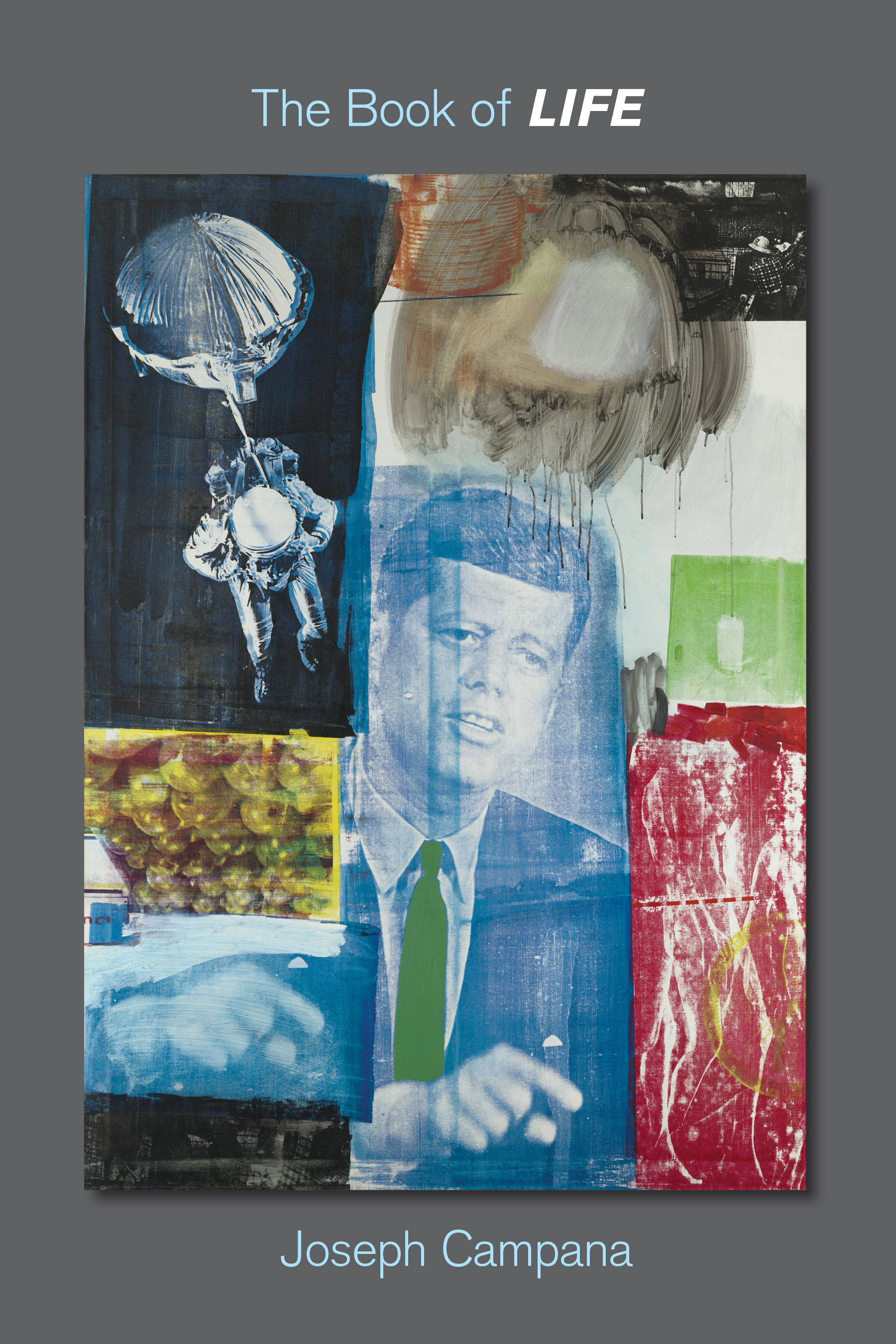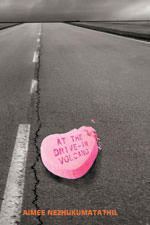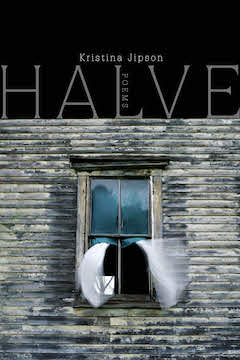The Book of LIFE
by Joseph Campana
$19.95
July Open 2016 Reading Period Selection
“These poems are a marvel the way life itself is a marvel.” —Natasha Trethewey
Taking inspiration from the iconic pages of Life magazine, The Book of Life immerses its reader in an ecstatic, ekphrastic experience of how life becomes history and how history comes back to life.
Format: paperback
Publication Date: March 1, 2019
“Life, like life, had a prior existence, but the iconic weekly news magazine whose images would saturate the country’s visual field was born in 1936, child of the New Deal and the Great Depression. In a brilliant structural proposition, Joseph Campana transforms a family trove of aging magazines into scaffolding for an extended meditation on the contours of self and national community. The writing in these pages is as sensuous and meticulous as the photographs it takes for prompts: ‘corn silk / and the squawk / of husking ears,’ ‘lawnmowers ripping / to life.’ But it is also much more: a questing, trenchant portrait of the perishable life we depend upon one another to sustain.” —Linda Gregerson, Caroline Walker Bynum Distinguished University Professor, Department of English, University of Michigan
“In poems that enact the heady rush of history, what we mean when we say “my life flashed before my eyes,” Joseph Campana gives us the world in swooning context. The Book of Life is at once an ecstatic accounting, a love poem ‘to love/what you can’t understand,’ an elegy for not only what is gone but also for what is steadily going. ‘That was/what lured me,’ he writes: ‘the song of the world disappearing before me….’ These poems are a marvel the way life itself is a marvel.” —Natasha Trethewey, U.S. Poet Laureate, 2012-2014
Praise for The Book of Life
Read a micro review by Brett Belcastro of American Microreviews and Interviews here.
Praise for prior publications
“The faces of Joseph Campana’s beautifully inventive first collection are those that stare most urgently at us while we grow blind: hunger (spiritual and literal), war, peace, fame, hope, fashion, heartlessness, greed. What this one vision does with the idea of the mask . . . is groundbreaking—the face of the maker, the face of the made.” —Jorie Graham
“Joseph Campana’s The Book of Faces is an extraordinary debut . . . not the expected fare but something finer, more provocative, enchanting and rich.” —Alice Fulton
“Campana’s poems haunt, instruct, and console me.”—David Wojahn
Read a review and interview with Joseph Campana in The Houstonia, 4/8/19, here.
The Book of LIFE finds inspiration in the pages of LIFE Magazine, from its origin in the Great Depression to its demise amid the Apollo missions, with many milestones between: the Korean War and Cuban missile crisis, the Vietnam War and immolation of Thich Quang Duc, and the Kennedy and King assassinations. LIFE’s compendium of the American century stretches from its initial cover, Margaret Bourke-White’s photo of the Fort Peck Dam in Montana, to its final, year-in-review issue covering the lunar mission, with an image of the Earth that awakened a planetary consciousness.
Using the lens of poet, arts critic, and scholar of Renaissance literature, Joseph Campana locates an individual life in the churning wake of these great events; he is a poet who persists in the hope of reawakening the past, while simultaneously finding and providing a guide for this journey called life.
Additional information
| Weight | .4 lbs |
|---|---|
| Dimensions | 6 × 5 × 9 in |
From The Book of Life (December 7, 1953)
A shirt loves a body the way
a bracelet kisses a wrist, kisses
the tender flesh stretched over
tendon and vein: a whole world
thrumming just below. Fingers
love motion the way the flesh
loves the deep electrical twitch
of the body involuntary, satisfied
with itself and one at last with
a music that loves to fill a room
the way a piano loves Liberace
and Victor Borge. Chrysler loves
soldiers the way a mother loves
a child, which strangely enough
is not unlike the way Santa Claus
loves toasters, deep fryers, coffee
makers, and electric razors all for
the gift of their shiny utility. Oh,
Pyrex, oh Playtex: contain contain
contain the ease of abundance,
which loves to billow and fill
a house the very way a chimney
loves smoke, the way all conduits
of transport love vicious motion:
the silky burn of a Pall Mall
searing like a car yearns for
one great and final acceleration
that can release only into starry
conflagrations under a watchful
desert sun. The desert loves sun
almost as much as it loves secrets
just as a fugitive loves Texas
and all solitary expanses of
passage unimpeded by custom.
Lovers love love and even more
they love to play dead. Imagine
the world whole and uninterrupted
by a desire for witness, the world
indifferent to all things pertaining,
the lovers now like statues buried
in the desert sand or hidden in
a dark cave that aches for collapse.
Chanel No. 5 loves Chanel No. 5
and wears nothing else to bed.
Naked, at last, it is finally itself
alone, vapors free in the night
air and practically fire now,
loving itself purely, the way
everyone loves useless gifts,
along with all other forms of
generosity indifferent to duty.
Imagine that: someone loved
you enough not to care, the way
a train, uninterested in terminus,
loves the interstitial hum of
tracks. Certain of their own end,
elephants love trains that speed
from darkened tents. Pull back
the flaps if you dare: all those
circles filled with the round “O”s
of faces tormented by wonder,
stretched by their own credulity
until the body becomes a letter
that would tell you precisely how
a body loves if only you could
read it. Slack-jawed, wide-eyed,
open-mouthed: the body one great
aperture. That’s how it loves,
in the manner of the sky that
loves the foolish conveyances
of tiny creatures so ambitious
for transport, and the sky loves
them all, nearly as much as
the shirt, simple covering,
loves the press of flesh beneath
diffident folds, loves the way
fabric caresses a body just as
the eye strokes the camera,
a shoulder cradles a phone,
and the phone tenderly carries
voices gathering a line from
so far away. How could they sound
so close? And it is just this close,
the way a mother cradles the child
she sees she can no longer hold.
First Issue
November 23, 1936
Scream of beginnings: what was once sequestered now haul
into light. There was a camera for you: there is always a camera
ready. All will be seen, the child now dangling from the hands
of the miracle man. Once you were poised between lives, an un-
breathing thing. Now plunge into this one, this life. Enter, now,
LIFE. All enter like patient passengers lining up for transport,
tickets in hand, a team of nurses in the background to usher
them through to destinations not yet final. Oh nurse of life,
complete in your un-attachment to me or to anyone or to basins
of porcelain, blood in water, sheets disarrayed but perhaps staged
for the camera. How much trouble can one life make, passing
through what it will pass out of at some as yet undetermined
date? Come, child, enter the field of vision with a red-faced
cry. You already have secrets to tell the glass. Somewhere in the
background your mother has disappeared behind the doctor
and nurses. Look: imagine the camera is your mother. Cry to
her, child, cry of beginnings. The engine of your life waits. The
flywheel is already spinning up.


 Joseph Campana is a poet, arts critic, and scholar of Renaissance literature. He is the author of three collections of poetry, The Book of Faces (Graywolf, 2005), Natural Selections (Iowa, 2012), which received the Iowa Poetry Prize, and The Book of Life (Tupelo, 2019). His poetry appears in Slate, Kenyon Review, Poetry, Conjunctions, Guernica, Michigan Quarterly Review, and Colorado Review, while individual poems have won prizes from Prairie Schooner and the Southwest Review. He has received fellowships from the National Endowment for the Arts, the Houston Arts Alliance, and the Bread Loaf Writers’ Conference. He reviews the arts, books, media and culture regularly for The Houston Chronicle, CultureMap, The Kenyon Review, and other venues and is the author of dozens of scholarly essays on Renaissance literature and culture as well as a study of poetics The Pain of Reformation: Spenser, Vulnerability, and the Ethics of Masculinity (Fordham, 2012). He teaches at Rice University where he is Alan Dugald McKillop Professor of English.
Joseph Campana is a poet, arts critic, and scholar of Renaissance literature. He is the author of three collections of poetry, The Book of Faces (Graywolf, 2005), Natural Selections (Iowa, 2012), which received the Iowa Poetry Prize, and The Book of Life (Tupelo, 2019). His poetry appears in Slate, Kenyon Review, Poetry, Conjunctions, Guernica, Michigan Quarterly Review, and Colorado Review, while individual poems have won prizes from Prairie Schooner and the Southwest Review. He has received fellowships from the National Endowment for the Arts, the Houston Arts Alliance, and the Bread Loaf Writers’ Conference. He reviews the arts, books, media and culture regularly for The Houston Chronicle, CultureMap, The Kenyon Review, and other venues and is the author of dozens of scholarly essays on Renaissance literature and culture as well as a study of poetics The Pain of Reformation: Spenser, Vulnerability, and the Ethics of Masculinity (Fordham, 2012). He teaches at Rice University where he is Alan Dugald McKillop Professor of English.



